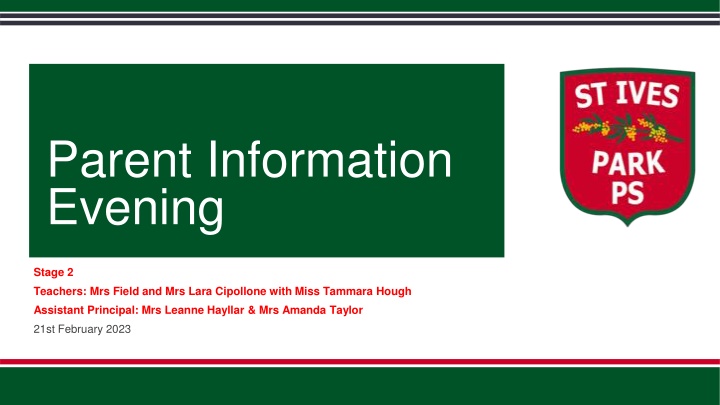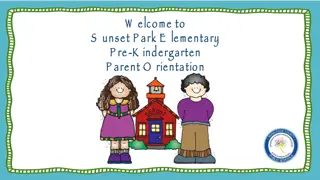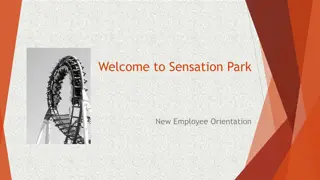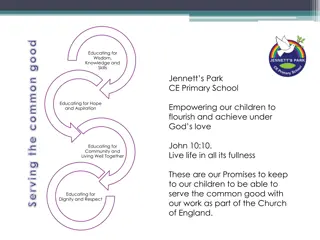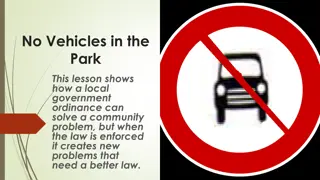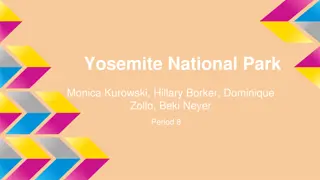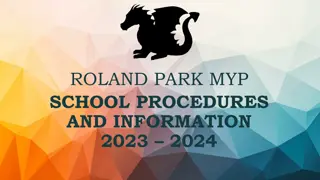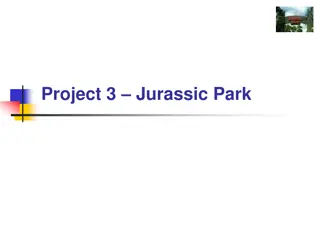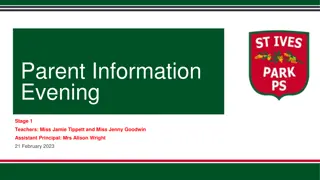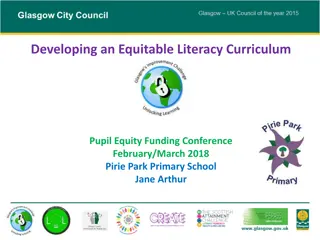St. Ives Park Public School Information Overview
St. Ives Park Public School is committed to inspiring and nurturing successful lifelong learners. Their mission focuses on guiding students to become balanced individuals who strive for academic and social-emotional growth while aiming for their personal best. The school's strategic directions include improving student growth and attainment, enhancing teaching practices, supporting student well-being, and fostering community connections. The school also follows the NSW Syllabus documents and enforces positive behavior through the Behavior Code for students. Additionally, they have a rewards system in place to recognize and encourage positive learning and behavior choices.
Download Presentation

Please find below an Image/Link to download the presentation.
The content on the website is provided AS IS for your information and personal use only. It may not be sold, licensed, or shared on other websites without obtaining consent from the author.If you encounter any issues during the download, it is possible that the publisher has removed the file from their server.
You are allowed to download the files provided on this website for personal or commercial use, subject to the condition that they are used lawfully. All files are the property of their respective owners.
The content on the website is provided AS IS for your information and personal use only. It may not be sold, licensed, or shared on other websites without obtaining consent from the author.
E N D
Presentation Transcript
Parent Information Evening Stage 2 Teachers: Mrs Field and Mrs Lara Cipollone with Miss Tammara Hough Assistant Principal: Mrs Leanne Hayllar & Mrs Amanda Taylor 21st February 2023
OUR VISION To inspire and nurture successful lifelong learners. OUR MISSION in the School Plan To ensure that educational programs at St Ives Park Public School guide students to develop into: o Successful lifelong learners o Balanced students, focussed on academic and social-emotional growth o Students who strive to achieve their personal best, accept and seek challenges in their learning .
School Improvement Plan 2021 - 2024 All NSW Public Schools have School Improvement Plans in place to guide their planning and student learning each year. The first strategic direction across the state is Student Growth and Attainment as set by the Department of Education. Our Strategic Directions at St Ives Park Public school include: Direction 1 Student growth and attainment improving learning to meet DoE targets. Direction 2 Quality practice and curriculum delivery to improve student learning improving teaching and learning. Direction 3 Connection and wellbeing supporting student wellbeing and community connection.
NSW Syllabus Documents All learning in NSW schools is developed from the NSW Syllabus documents. All syllabus documents are written in Stages which represent the range of learning within each class. These are all freely available on the NESA Website at https://www.educationstandards.nsw.edu.au/wps/portal/nesa/k-10/understanding-the- curriculum/curriculum-syllabuses-NSW NSW Government Department of Education Parents are supported to access information via the A-Z parents guide link provided here: https://education.nsw.gov.au/parents-and-carers/a-z-parents-guide
NSW public schools Behaviour Code for students Student behaviour All students in NSW public schools must abide by the behaviour code. Positive behaviour for learning At SIPPS students are actively taught the expectations of the school in each class. There is a focus on positive behaviours. Students are guided in their learning, adjustments are made and consequences will occur should behaviours continue. Staff inform parents of behaviour concerns as required. https://education.nsw.gov.au/public-schools/going-to-a-public-school/translated- documents/behaviour-code-for-students Available in many languages
PBL Reward system Free and Frequent rewards Catch cards are designed to catch students frequently making great learning and behaviour choices. 50 = wristband. Long and strong rewards Merit cards which are linked to academic achievement and achieving SIPPS expectations within Respect, Responsibility and Personal Best. Merit awards add to Bronze, Silver and Gold awards Classroom reward system Dojo points, table points and sometimes class points.
Communication @ SIPPS Newsletter The Patter comes out each Monday fortnight and is the main form of communication across the school for families. SchoolZine app notifications support parents with quick alerts regarding information and changes. These are not always full sentences due to the character limits. Facebook information is often populated with Department of Education information for all parents. Some school based pictures and event notifications are included on FB. Class parents share P&C and SIPPS information with the parents and often reinforce information regarding events and activities across the school. This communication should never include advertising. P&C information flyers to keep parents up to date with P&C events and activities.
Reporting to Parents and Carers Each year two written reports are provided to all parents in NSW. At SIPPS the end of Term 2 and Term 4 are when reports go home to families. Parent / Teacher Interviews are offered to parents in Week 9 & 10 Term 1 2023. Parents or teachers may request interviews at other times throughout the year.
Key Learning Areas English Reading All students are taught a range of reading and comprehension strategies during Literacy Groups. Comprehension, fluency and accuracy are used to assess your child s reading progress. Explicit modelled reading lessons occur multiple times per week focusing on inferences, making connections to text and developing vocabulary. Writing This term sees the writing focus of Narrative and Persuasive texts. Later in the year we will look at Informative texts. Spelling, handwriting and grammar skills are also taught in conjunction with writing. Speaking and Listening skills are developed for successful oral communication. Students are provided with opportunities to share their learning and work during class discussions and presentations.
Key Learning Areas Mathematics Maths is taught in class groups. Whilst catering for individual learning needs and developing core mathematical concepts our use of rich tasks are designed to engage students in open ended and authentic learning experiences. Students participate in Number Talks four times a week to encourage and develop their mathematical and strategic thinking. Mathematics is broken into strands: Number & Algebra: Students will expand their understanding of place value, number and order of operations as well as explore problem solving tasks. Measurement & Geometry: Students investigate properties of two-dimensional shapes and three- dimensional objects & angles. Statistics & Probability: Students will create and interpret data using a variety of graphs as well as analyse chance. Working Mathematically is embedded into each of the strands and underpins all aspects of Mathematics. It is the ability to reason and communicate how answers are obtained through the strategies used.
MATHEMATICS Number talks are a standout for Mathematics at St Ives Park PS. Number talks focus on explicit teaching of number strategies to support understanding of addition, subtraction, multiplication and division. Rich Mathematical Tasks These tasks are woven into the Mathematics teaching and learning program. During rich mathematical tasks, students ask questions and use known facts to explore mathematical problems, develop fluency and make connections to new concepts. Students use mathematical language, concrete materials and in/formal recording to demonstrate their understanding and mathematical reasoning.
Key Learning Areas History and Geography In History this semester Stage 2 will learn about First Contacts. Beginning with the history of Aboriginal and Torres Strait Islander peoples, students examine European exploration and colonisation in Australia and throughout the world up to the early 1800s. Students examine the impact of exploration on other societies, how these societies interacted with newcomers, and how these experiences contributed to their cultural diversity. Science Technology In Science this term we will be investigating Earth s relationship with the Sun. Students will explore the effect of the interactions between the Earth and the Sun. Inquiry question: What occurs as a result of the interactions between the Earth and the Sun? These two units are taught simultaneously incorporating other Key Learning Areas.
Key Learning Areas PE This learning area encourages children to understand and value themselves and others and promotes physical activity through sport and fitness. Each term, students participate in the Got Game program with an external specialist teacher. This term students will attend Got Game on Tuesdays the program will be focusing on Maths and Movement. Class fitness takes place once a week along with PSSA & School Sport on Fridays. PDH In class and with Mrs Stone, students will learn about personal wellbeing, emotional self- regulation and anti-bullying during PDH lessons. Making safe choices on the internet and cyber safety is also a focus. As part of our class program we promote mental well being and self-awareness through the Smiling Mind program.
Key Learning Areas Library In the library, Mrs Allman provides an enriching environment where students are introduced to a variety of literature and are encouraged to borrow books each week. Children should bring a library bag to protect the books that they borrow. 3 Diamond has their lesson on Thursday, while 4/5 Emerald has theirs on Friday. Art Mrs Stone provides all children with opportunities to make art works and to appreciate the work of artists, crafts people and designers. The children experiment with art forms, including drawing, painting, sculpture and printmaking and they investigate a variety of subject matter such as people, places, spaces and other living things. Music & Drama Mrs Stone offers students a variety of experiences in music and drama. Students will focus on Drama in Term 1 and Music in Term 2.
Homework Homework is designed to reinforce and practice skills students have completed in class. It should encourage a child s self-discipline and foster connections between home and school. Homework will include reading, Mathletics, spelling (in conjunction with our spelling program) and projects for different learning areas. Students will be required to keep a reading log for parents to sign off each week. Homework for Stage 2 will be due on a Wednesday and go out on Thursdays. 4/5 Emerald- homework on Google Classroom 3 Diamond- homework in books 15 to 20 minutes of reading of a range of texts and recorded in their reading log. Spelling words and activities each week Mathletics Speeches or projects
PSSA Summer Sport: League Tag (Term 1 and 4) Winter Sports: Soccer and Netball (Term 2 and 3) School sport will occur on Friday mornings with the teachers not attending PSSA. Any notifications regarding the cancellation of games or training will be sent via the school app.
Stationery 1 Small Pencil Case 1 Red Pen 1 Pack of HB Lead Pencils 2 White Erasers 1 Pencil Sharpener 2 Large Bostik Glue sticks 1 Scissors 2 Highlighters 1 Pack Whiteboard Markers 1 Ruler 1 Large Exercise Book 1 Box of Tissues 1 Headphones (no earbuds) 1 Pack of Textas 1 Pack of Coloured Pencils 2 A4 Document Wallets (plastic envelope folders) Please ensure your child has supplied all the resources on the Stage 2 stationery list. Please label everything that your child may take off or lose.
Absentees Please remember to send absentee notes online via the Schoolzine app or website when your child returns after an absence (you can still write a physical note if you d prefer). For the purposes of the class roll, the note needs to indicate the date of absence and whether the absence was caused by illness (sick) or another reason (leave). Leave needs pre-approval in writing by the principal. Please remember that children who arrive after the morning bell must enter via Gate 1. Teachers mark the roll first task each morning. If you wish to collect your child before the end of the day, you must call the school and come to Gate 1. Please abide by the DoE Covid Safe guidelines and keep your child at home if they are displaying any signs of Covid.
HEALTHY OPTIONS Healthy options are highly recommended to help effectively fuel your child during the day. No Sweets or treats. No sharing Please do not send along packets of sweets and treats. No sharing of food is permitted.
Key Dates for your diary o Week 4: All students have been placed in their Google Classroom. o 17/2 Summer PSSA begins o 21/2 Parent Information Evening o 27/2 School Photo Day o 20-24/3 Individual Learning Plans Parent meetings o 15-27/3 NAPLAN testing window Yr 3 & 5 o 21/3 Zone Swimming Carnival o 21/3 31/3 Parent Teacher Interviews information coming in the newsletter for families. o 30/3-15/5 Application window for Year 5 Opportunity Class entry in 2024 o 6/4 2.15pm 3pm Festive and Easter hat parade
Promoting communication, understanding and cooperation between Teachers and Parents. P&C President Stewart Duncan SIPPS P&C Website link http://www.sippspandc.org/
Class parents Each class has a class parent. Class parents are in contact with both class teachers and the P&C. They are a positive source of true and correct information from the school, class and P&C. They provide reminders and pass on to parents exciting event information. 3 Diamond - Sophie HIbburd 4/5 Emerald - Greg Raine
